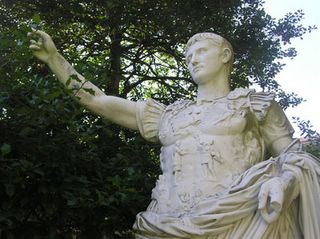** Caesar Augustus

Meet Caesar Augustus
Caesar Augustus was born Gaius Octavius, son of an up-and-coming family that lived just outside Rome. His father was the first in his family to be elected to the Roman Senate. And his mother was the niece of Roman strongman Julius Caesar, who was Octavius's patron from the start.
Caesar's Heir
When Julius Caesar was assassinated in 44 BC, an 18-year-old Octavius learned that Caesar had adopted him and made him his chief heir. He assumed the name Gaius Julius Caesar Octavianus--Octavian, for short. It was a dangerous move, for it made him a potential target of those who had killed his great-uncle. It also made him the rival of Mark Antony, Caesar's old lieutenant, who thought that he would be Caesar's heir and had seized all the late dictator's assets.
Octavian's youth may have saved him. Few underestimated him for long, though. He quickly won the allegiance of many of Caesar's old troops and maneuvered the Senate into raising him to the rank of senator.
Triumvirate II
In subsequent years, Octavian proved himself a master of the double-cross. First, he joined the Senate's fight against Mark Antony. Then, he allied himself with Antony and Lepidus (another former Caesar lieutenant) to divide power between them in what became known as the Second Triumvirate (the first was Caesar, Pompey, and Crassus). Then, he eliminated Lepidus while undermining support for Antony, who was operating out of Egypt and had married its infamous queen (and former Caesar mistress), Cleopatra.
Civil war was inevitable, and in 31 BC, Octavian and his admiral, Agrippa, won a decisive naval victory over Antony and Cleopatra at the Battle of Actium. The two lovers escaped but committed suicide soon after.
Caesar II
From this point on, Octavian focused on securing his power. He established an army of 150,000 legionnaires loyal only to him. He created a personal bodyguard (the Praetorians) stationed in Rome. And he created a first-rate system of roads to maintain order and increase trade. In principle, the Senate continued to exercise its powers. But Octavian was the princeps, or first citizen, and his own power in this new "principate" was absolute--exercised through subordinates and politicians comfortably under his thumb.
Once his rule was secure, Octavian set out to revive old religious rites, encourage marriage and penalize adultery, create a civil service, institute the first Roman fire brigade and police force, and regularize taxation. As propaganda to support these measures, he emphasized his own majesty by adopting the name "Augustus," a symbolically potent term related to the terms for ritual divination (augury) and spiritual authority (auctoritas).
Death and Deification
As Augustus became Rome's first emperor, his stepsons, Tiberius and Drusus, extended the empire in the north to include Yugoslavia, Hungary, and Germany as far as the Elbe. Yet Drusus died while on campaign, and many of Augustus's other male relatives also met untimely ends, so Tiberius was left as virtually the sole candidate to succeed his stepfather. He was, consequently, adopted as son and heir in AD 4, signaling to all of Rome that the principate was hereditary.
Augustus had arranged for the Senate to proclaim his great-uncle Julius Caesar a god, and when he himself died in August AD 14, the tradition continued. He was posthumously enrolled among the gods of the Roman state. Before he died, he had seen to it that Tiberius was made so powerful that the principate would continue well beyond his death, such that no one could seriously hope that the ancient Senate would ever fully regain power. If Julius Caesar had killed the republic, Augustus saw to its burial. "Caesars"--related to Julius Caesar or not--would rule for centuries.
~ Mark Diller
August 31, 2005



0 Comments:
Post a Comment
<< Home